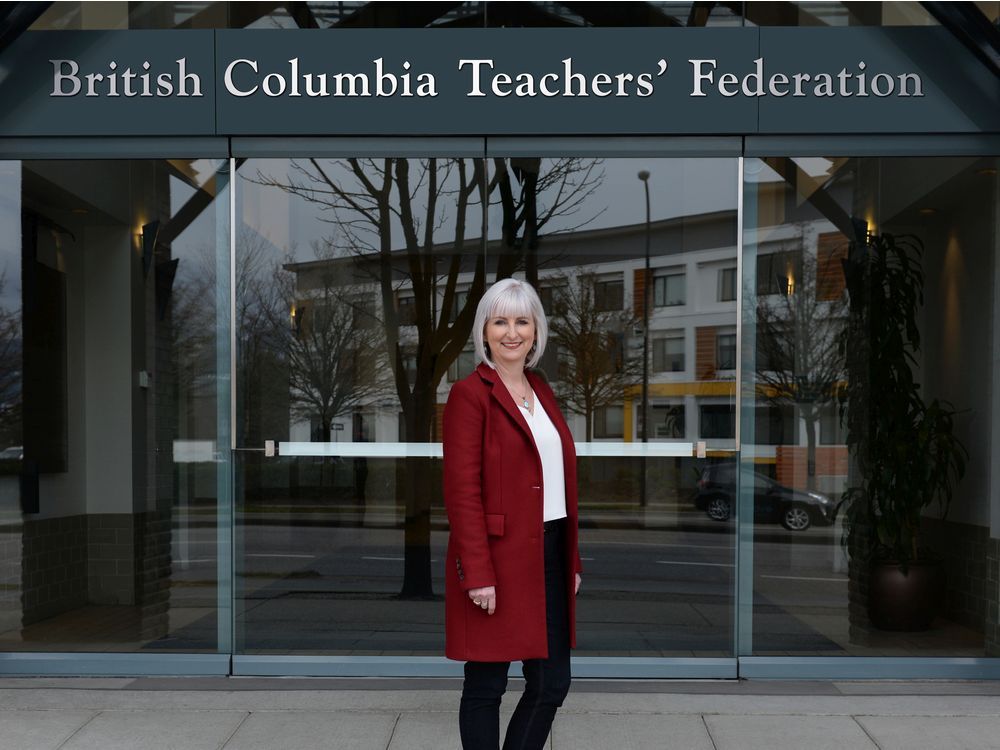Vaughn Palmer: BCTF draws up internal plan for escalating job action

Credit to Author: Gord Kurenoff| Date: Fri, 24 Jan 2020 02:14:30 +0000
VICTORIA — The B.C. Teachers’ Federation has crafted a plan to pressure the John Horgan NDP government into putting more money into contract talks with teachers.
The tentative plan, laid out this week in a confidential missive from BCTF president Teri Mooring, needs final approval from union representatives in an assembly at the end of the month.
But approval is likely, given union determination to secure an increase greater than the “two per cent a year over three years” settlements accepted by most other public-sector unions.
The first stage of the plan builds on actions started last year and includes putting pressure on NDP MLAs via “email” and “organized gatherings at MLA offices.”
All the while, the union would provide materials, grants and resources to locals “to support organizational considerations in preparation for future stages of the action plan.”
The union would also work at bringing the public up to speed on its bargaining position and the possible shape of things to come.
One item on the list calls for the federation “to publish a public-friendly article … on the impact of lost instruction hours on students.”
Subsequent stages of the plan could see teachers translate that hypothetical impact into reality by withdrawing instruction hours from students.
The second stage would begin with the union executive committee seeking a strike vote, supervised by the Labour Relations Board.
“With the authorization of a LRB strike vote,” there would follow “withdrawal of non-teaching activities and administrative tasks during instructional time and administrative activities outside of instructional time.”
For greater clarity, the plan provides some examples of stage-two actions:
“Members will not participate in ‘meet the teacher’ events or formal parent-teacher conferences, prepare anecdotal report cards or provide any student assessment data to administrative officers, or supervise playgrounds, detentions, hallways, lunchrooms, or gymnasiums at recess or lunch or before or after school other than the students of the member’s class.”
The union would also begin preparing to have teachers vote on whether to proceed to the next stage: rotating strikes.
Stage three sounds like a recipe for total chaos. Each union local would craft a plan “to fully withdraw one-fifth of the members, worksites, or communities in the local on each day of the week on a school-by-school rotating basis.”
Stage four could see the executive committee schedule a second membership vote to authorize a full-blown strike, province wide.
All this was laid out in a memo that Mooring sent out Tuesday to local presidents, administrative staff and the executive committee.
It was headed “confidential” with a plea that it was “not for posting, forwarding or copying.”
But as evidence that not everyone who received the document was comfortable under the cone of silence, several copies were forwarded to Keith Baldrey of Global TV.
After he reported the details of the plan at mid-morning Thursday, the union responded by emphasizing that an LRB-appointed meditator remains in place in bargaining.
“The BCTF remains fully committed to the LRB mediation process,” said a posting on social media. “There can be no strike vote, job action, or lockout by the employer while that process continues.”
But for all the purported commitment to mediation, the union does not appear to have all that much confidence in either the process or the mediator.
The LRB appointed mediator David Schaub last June at the behest of the employer, not the union. Last fall, he recommended a settlement of two, two and two per cent over three years, with some tweaks and tradeoffs on issues pursued by the union.
The union rejected the recommendations out of hand.
Talks may resume under Schaub’s auspices next month, and it would be within his power to keep things going for some time.
But the federation’s plan also has the union’s executive committee contemplating that it could seek a strike vote “no earlier than Feb. 15.”
By coincidence, that is just three days before the release of this year’s provincial budget.
The budget is expected to reaffirm two things Finance Minister Carole James has been saying since the BCTF began putting pressure on the New Democrats to top up education funding in general and the bargaining mandate for teachers in particular.
First, “the mandate is the mandate.” Most other unions have already signed for combinations of wages and benefits that, fully costed, are within the mandate of two, two, and two per cent over three years.
The New Democrats exceed that limit at their fiscal peril. Other public-sector unions negotiated me-too clauses that would entitle them to a wage top-up equal to any outside-the-mandate settlement with the BCTF.
James has likewise rejected calls from the BCTF and others to increase education funding, even at the risk of going into deficit.
When asked about the possibility at the most recent update on provincial finances, James emphasized the need to keep the budget in balance.
“From my perspective, that’s the job,” she told reporters. “To make sure you are spending within your means, that you’re balancing the budget.”
Not likely will James or Premier Horgan budge from their determination to hold the line, even if the BCTF proceeds all the way through their plan to stage-three or stage-four disruptions of the schools.
More likely, the New Democrats would allow the dispute to go until the public is fed up, then legislate a settlement based on the recommendations from the mediator.
CLICK HERE to report a typo.
Is there more to this story? We’d like to hear from you about this or any other stories you think we should know about. Email vantips@postmedia.com